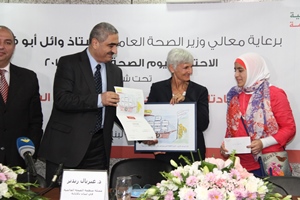 Dr Gabriele Riedner and DG Dr. Walid Ammar presenting the certificate to the winner of the art competition6 April 2015 ¦ Beirut – Every year, the World Health Organization selects a priority area of global public health concern as the theme for World Health Day, which falls on 7 April, the birthday of the Organization. The theme for World Health Day 2016 is diabetes, a noncommunicable disease directly impacting millions of people of globally, mostly in low- and middle-income countries.
Dr Gabriele Riedner and DG Dr. Walid Ammar presenting the certificate to the winner of the art competition6 April 2015 ¦ Beirut – Every year, the World Health Organization selects a priority area of global public health concern as the theme for World Health Day, which falls on 7 April, the birthday of the Organization. The theme for World Health Day 2016 is diabetes, a noncommunicable disease directly impacting millions of people of globally, mostly in low- and middle-income countries.
In Lebanon, World Health Day is celebrated this year on 6 April, with the Ministry of Public Health, highlighting the challenges and opportunities associated with diabetes in Lebanon under the slogan of “Break bad habits: prevent diabetes.”; and presenting the national diabetes prevention strategy by the director of the national diabetes control programme.
Diabetes is on the rise everywhere and is now most common in developing countries. Its impact is felt by individuals, families, communities and national economies, yet much of its burden is avoidable.
The numbers speak for themselves. With 422 million adults affected, there are 4 times more people with diabetes today than there were in 1980 as stated in the world diabetes report this year. Diabetes is rising fastest in the world’s low- and middle-income countries. In 2012, diabetes caused 1.5 million deaths. Higher-than-optimal blood glucose levels caused an additional 2.2 million deaths, by increasing the risk of cardiovascular and other diseases.
“Out of the 422 million people living with diabetes across the world, 43 million are in the Eastern Mediterranean Region. Our Region has the highest prevalence of diabetes in the world. From an estimated prevalence of 6% in 1980, the prevalence of diabetes had risen to 14% in 2014, and this number is still rising. Recent studies show that the prevalence of diabetes in adults has reached more than 20% in some countries,” said Dr Ala Alwan, WHO Regional Director of the Eastern Mediterranean.
In Lebanon, the latest WHO STEPS study in 2009 shows that the numbers of people with diabetes are increasing compared to previous years. Most of the increase of diabetes reflects rising rates of type 2 diabetes in adults, which is largely caused by unhealthy eating and lack of physical activity. A third of the Lebanese population is exposed to 1 or 2 noncommunicable disease risk factors, such as tobacco smoking, unhealthy diet and physical inactivity.
In the poorly controlled patient, diabetes can cause complications including heart attacks, strokes, kidney failure, blindness, and foot ulcers than can lead to amputations. Many of these complications, and these premature deaths, could be prevented. The technologies and medicines to enable people with diabetes to live healthy lives exist, yet still do not reach those who need them.
Preventing deaths and complications from diabetes requires access to affordable health-care services with equipment sufficient to diagnose and monitor diabetes; patient education to promote healthy diet, physical activity and self-care; essential medicines for diabetes management, including life-saving insulin; regular screening for complications and early treatment when they are found; and a referral system across various levels of health care.
In Lebanon, the Ministry of Public Health and WHO launched in 2012 a pilot initiative to early detect and manage people with noncommunicable diseases, including diabetes, and modify behavioural risk factors, such as diet, physical activity and tobacco use. More than 14 000 people have been screened for body mass index, fasting blood sugar, blood pressure and lifestyle habits and 2 out of every 5 people were found to be at risk and subsequently referred to health centres for further evaluation and care.
The Health Minister HE Mr Wael Abou Faour stressed the Ministry's commitment to support the national diabetes program and noncommunicable diseases in general, and the expansion of the initiative for early detection of diabetes and access to treatment.
“Together, we can halt the rise in diabetes and provide care to improve quality of life for the millions of people living with the disease. Everyone has a role to play.” concluded Dr Gabriele Riedner, acting WHO Representative to Lebanon.


